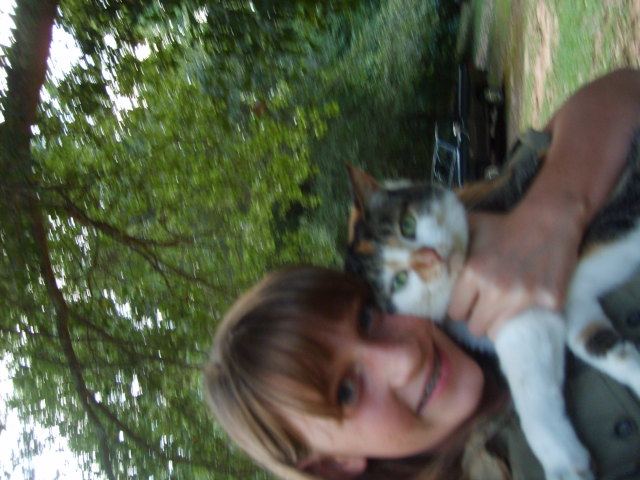QuestionMale neutered shelter cat, adopted at about age six, fixated on makeup sponges. Not kidding. Not interested in alternative toys. Retrieves like a spaniel, very amusing and clever, but inexhaustible. Would describe behavior - in the wild - as predatory. Will fixate afterward on the hand that throws even if empty. Also very needy and clingy. Recent incidents of biting attacks. I'm a lifelong cat owner and have never seen the like. ASPCA reports it's never heard of or seen such behavior. Tentatively suggested Prozac. I laughed. Not laughing now. Any ideas?
AnswerJulia,
The difficulty in adopting an older cat is not knowing what kind of emotional trauma the poor cat went through in it's short life. More than likely it has had a few homes or left alone alot and that is why he is needy and clingy...he is scared you are going to leave him, or take him away. Be patient with him. It may take some time but he will relax when he realizes that he is at your home to stay. Suggestion: I wouldn't take any trips anytime soon and leave him alone. Give him the feeling of security that he needs.
Cats can pick the most odd-ball things as a favorite toy! One of my ferals just LOVES her racehorse whip. She drags it around and has even learned to turn sideways with it to get it through a door! Another has a piece of fleece material that he carries around and 'fights' with. All of my tame ferals will retrieve. I can spend unlimited time throwing, with them bringing it back. Mine love to 'fetch' sparkly craft balls that I get at the Wal-Mart craft dept. or a fabric store in a package. When I am tired of throwing them, one of the cats will walk around with it in their mouth. One likes to 'fetch' in the morning. I can tell how many times she tried to wake me up to play by how many toys are laying by my face when I wake up!
His energy may be an outlet for stress and nerves. He must have had at least one feral parent. Ferals are notorious 'retrievers' and love to play 'throw and fetch' because by nature they are hunters. He may also be attacking and biting, not out of meanness, but because he is hunting and 'killing' something that is moving...a leg, a hand, etc. If they are inside cats, you need to satisfy that hunting urge. Try getting some furry stuffed mice that you can throw and he can bat around, put some ping pong balls in the bathtub (with the drain plugged or they get stuck), pull a string around that he can chase and 'attack', etc. Also get the butcher to cut in half some beef ribs and give those raw to the cat as a treat. It satisfies the fresh kill instinct and the fibers in the meat cleans their teeth. Also try a pet laser light. They are excellent for burning up energy. Cats like to chase the little 'red bug' on the floors, ceilings, and walls.
Kitty Prozac is common for aggression or emotional issues. But, I would only go that route as a last resort. Personally, I don't think your cat needs it. He just needs time, patience, understanding, love, and time to adjust. Maybe having another cat as a companion and playmate for him will help. It would need to be about the same age, temperament, and personality.
Have you tried Bach's Rescue Remedy? People swear by it for aggressive behavior, and other emotional and physical behaviors. It is all natural and you can get it at a health food store (people use it too) or on-line. I will give you some detailed information about it:
Bach's Flower Essences were developed for humans, but they work on animals as well. Flower essences work on both physical and emotional issues to help heal and calm. They are non-toxic and have NO side effects, and are safe for pets and animals of all sizes.
BACH'S RESCUE REMEDY is the most commonly used. Rescue Remedy can be used for any acute trauma, fear, or stress situations. It will not change the inherent temperament of an animal, but will help bring them into balance.
It can be given by mouth, but it can also be sprayed on the skin or ears with a spray bottle and it will still have a beneficial effect.
For cats, only a few drops (2-4) are necessary. They need not be swallowed, but MUST contact the mucous membranes (gums, tongue, lips). You can also add a dropper full to the water dish, or a few drops on wet food (there is no effect of dilution). You can add a dropper full to a spray bottle filled with spring water and use it to spray a room, carrier, car, around litter boxes or plants, or other problem areas. You can also put a few drops in your hand and pat the animal on the head and around the ears with it--the head is very sensitive to energy and will absorb the flower essences in this way.
There is no improper or wrong method of applying the Bach Remedies. It is not necessary to be precise in counting the number of drops in any of the dilution methods. The Rescue Remedy is non-toxic and therefore has no side effects.
For most behavioral problems 3 to 4 times a day for 2 to 4 weeks is sufficient, though some may animals may need drops or a dropper full added to their drinking water long-term.
More information about Bach's can be found on these websites:
(copy and paste, or type, the whole link into your address bar)
http://www.bachflower.com/Pets.htm
http://www.nelsonbach.com/BFE_for_pets.html
http://www.petsynergy.com/flower.html
http://www.oes.org/page1/Bach-Rescue-Remedy.html
I hope this information is helpful and gives you some insight and ideas.
Tabbi

 Trying to blend families
QuestionQUESTION: Me and my 4 1/2 year old male cat rec
Trying to blend families
QuestionQUESTION: Me and my 4 1/2 year old male cat rec
 any alternatives to hunting?
Question
Lucky and me
My cat Lucky was found a stray ad
any alternatives to hunting?
Question
Lucky and me
My cat Lucky was found a stray ad
 Introducing an adult cat to a resident kitten
QuestionHi Tabbi,
I have a 5 month old kitten that was
Introducing an adult cat to a resident kitten
QuestionHi Tabbi,
I have a 5 month old kitten that was
 Introducing Kitten to Solitary Cat
QuestionI just got a 13 week old kitten who is really f
Introducing Kitten to Solitary Cat
QuestionI just got a 13 week old kitten who is really f
 Change in cat behaviour
QuestionCurry, before kittens
QUESTION: Hi Shant
Change in cat behaviour
QuestionCurry, before kittens
QUESTION: Hi Shant